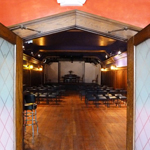Mayor Daley’s out and Rahm Emanuel leads in the latest Tribune election poll. But which candidate really cares about Chicago’s arts and culture?
By Elliott Beazley, Staff Writer
SAIC has a long-lasting relationship with Mayor Richard Daley. In fact, at a dinner honoring Chinese President Hu Jintao this past January, Daley said, “Chicago is home to one of our nation’s great schools of art and design: the School of the Art Institute of Chicago. It is one of the oldest accredited independent schools of art and design in the United States and attracts students from around the world.” (Notably, Daley was announcing a one million dollar grant donated by the Pritzker family dedicated to the recruitment of Chinese students by SAIC.)
Aside from supporting SAIC, Bill and Maggie Daley’s contributions to Chicago’s art and culture, from theaters to parks, are a major part of their legacy to the city. But news that the city’s Department of Cultural Affairs has been drastically cut, and that Commissioner Lois Weisberg, former head of the DCA, has resigned, leave the future of the arts up in the air. What will Mayor Daley’s departure mean for Chicago’s art and culture?
The campaigns of six mayoral candidates focus on everything from the economy and crime to immigration and traffic, but art is a minor point in their campaigns. Here are four candidates that, if elected, may or may not continue to support the arts in the future.
Rahm Emanuel
The campaign for Rahm Emanuel began with a tear. Last September, the usually foul-mouthed former White House Chief of Staff became emotional describing his family’s immigration to America. But can he fill Daley’s big-city shoes? Known for his fundraising abilities, Emanuel’s celebrity status doesn’t hurt — he’s been endorsed by two U.S. Presidents (Obama and Clinton) and in late January campaigned on the streets of Chicago with SNL star Andy Samberg. For Emanuel, becoming mayor of Chicago is like walking a fine tightrope: on one side, he must take notice of the inner-city problems facing Chicago — unemployment, crime, and traffic, to name a few key issues. On the other side of that rope is the city’s global status. What (or who) can turn the Second City into the “best” city in the world?
Emanuel initially faced a major roadblock when opponents said his residency bars him from running for mayor (the candidate moved into the city limits less than a year before declaring his candidature). But Emanuel has nonetheless emerged as a strong favorite in the polls. After all, Emanuel grew up in Chicago and worked for Mayor Daley on numerous projects.
Position on the arts: Of all the candidates, Emanuel has the strongest ties to the arts. He’s a former ballet dancer, and his wife worked for the Art Institute. In an interview with Time Out Chicago, he said, “I believe the city government can and must play a role that allows our arts and culture to flourish.” He added that he intends to increase arts education in school, is against privatizing Chicago’s festivals, and would also like to change zoning and development rules to encourage artistic growth throughout Chicago’s neighborhoods.
Rahm’s goal: Get more than 50% of the votes so he doesn’t have to have a runoff in April.
More info: chicagoforrahm.com
Carol Moseley Braun
Carol Moseley Braun was the first African-American woman elected to the United States Senate, where she served for six years. She has campaigned on the platform that she is the only candidate who actually relates to voters. While Emanuel and Chico are multimillionaires, Braun, like most Chicagoans, is facing financial uphill battles, and carries significant debt.
By contrast, Braun has tried to paint Emanuel as a celebrity outsider. Many African-Americans, including Braun and Rep. Danny Davis, turned their backs on Bill Clinton when he recently endorsed Rahm Emanuel. Davis issued a public letter saying: “The African-American community has enjoyed a long and fruitful relationship with the Clintons; however, it appears as though some of that relationship may be fractured.” Does this mean that the election is turning into a battle of the races?
Before the new year, protesters in favor of Braun rallied outside the Sun-Times and called for columnist Neil Steinberg to be fired, after he wrote that Braun “represents the ego-maniacal muddle that Chicago black leadership has slid into, where calls for imaginary and self-destructive racial solidarity trump minor concerns like reason or history.” Braun is in second place in the latest Chicago Tribune poll.
Position on the Arts: Braun told Time Out Chicago that “it behooves the city administration to create a supportive atmosphere for the arts, and to support cultural entrepreneurship, and artists’ ability to earn a living.” Her goal is to focus on arts education in schools and community-based arts initiatives, and adds, “I would love to see a vibrant arts community in the neighborhoods, and an improved climate for live/work space for artists.” Although she claims to be an enthusiastic arts supporter, Braun’s position on arts in the city is far less articulated than Emanuel’s.
How can she win? Make sure Rahm doesn’t get the majority, finesse her strategy, and lure Chico’s voters.
More info: carolforchicago.com
Gery Chico
Gery Chico is Mayor Daley’s former chief of staff; unfortunately for Chico, Daley isn’t officially endorsing anyone for his old job. However, Chico has gained some important recommendations that have helped his campaign, including the endorsement of the Fraternal Order of Police (an 11,000 member union), thanks to his promise to hire 2,000 more officers.
U.S. Representative Luis Gutierrez, a leader in immigration reform and a Chico supporter, has accused Emanuel of not fully supporting the DREAM Act, legislation that prevents the U.S.-born children of illegal immigrants from being deported.
Of Mexican, Lithuanian, and Greek descent, Chico has appeared as the immigrant’s candidate. “The city of Chicago is a city of neighborhoods and city of immigrants. … [If I’m] privileged to be elected mayor, I won’t let [deportation] happen,” Chico said at a Deportation Moratorium rally on Jan. 14.
Position on the arts: Chico is an active member of Chicago’s arts community, as a frequent visitor to the National Museum of Mexican Art, the Chicago Architecture Foundation, the Museum of Contemporary Art, the Art Institute of Chicago, and the Chicago Symphony Orchestra, he told Time Out. He has already contributed to the scene by helping restore murals in Chicago public school buildings, and creating an inventory and catalogue of said murals, during his tenure working for the school system. He says that he would hold grassroots forums to assess the impact of privatizing city festivals before deciding on that issue. And finally, Chico says he would like to create smaller versions of the theater district throughout Chicago’s neighborhoods.
The path to victory for Chico: Take back votes from Miguel del Valle to beat Braun.
More info: gerychicoformayor.com
Miguel del Valle
Miguel del Valle, Chicago’s City Clerk, is a humble man who hasn’t been lucky in this campaign. His fundraising is very low and his endorsements are few. Maybe Chicago could use an anti-establishment type of candidate, but apparently that’s not what the city wants.
Calling himself “the poorest candidate with the most to offer,” del Valle has focused his campaign on homelessness, hunger, and environmentalism. Though these issues are important, they haven’t captured the attention of the greater Chicago population. Frankly, most haven’t been informed of del Valle’s values because he isn’t advertising his campaign. Del Valle is taking some votes away from Gery Chico but none from the other contenders. If del Valle continues to lack in basic political forms of communication, he doesn’t have a chance of winning this race.
Position on the arts: Del Valle told Time Out Chicago that “as I learned years ago when I was executive director of Association House, a social service agency in Chicago, the arts feed the soul. Even as we struggle in this difficult economic environment, we must not undervalue the arts.” Like the other candidates, del Valle hopes to increase funding for arts education in schools, and promote Park District classes and festivals. He has a personal connection to the arts through his son, Esteban del Valle, who has an MFA from the Rhode Island School of Design. He hopes to encourage greater youth participation in the arts.
Path to Miguel del Valle’s victory: Raise money or go home.
More info: delvalleformayor.com







